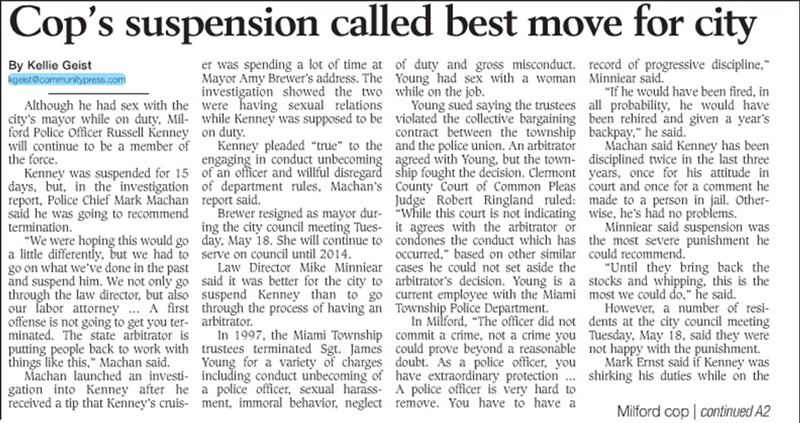A Sixth Circuit Court of Appeals judge has denied the Milford-Miami Advertiser's request to appeal a 2012 ruling that charged the Gannett-owned suburban weekly with defamation and ordered the paper to pay the defamed plaintiff $100,000 in damages.
In an article published in the Advertiser on May 27, 2010 titled "Cop's suspension called best move for city," the paper implicated Miami Township police officer James Young, who years before had been mired in legal trouble for accusations of sexual assault that were eventually disproven, in its article discussing another sex scandal in the area.
According to court documents, in 1997, Young was initially fired from his job after a woman named Marcie Phillips accused Young of forcing her to perform oral sex on him while Young was on duty. An internal investigation revealed that the two had actually been engaged in a relationship prior and that Young had spent time at Phillips' house while on duty. The allegations, however, were entangled in questions about Phillips' character and concern that she could have been lying about the rape because the relationship between the two had recently ended on rocky terms.
When DNA testing on semen found on a rug in the woman's home proved that the DNA didn't match Young's, he was exonerated and reinstated to his position.
The Advertiser article explained that Young had been terminated for sexual harassment, immoral behavior, gross misconduct and neglect in the line of duty and also stated that "Young had sex with a woman while on the job," which formed the basis for Young's defamation suit.
The 2010 article dealt with similar accusations lodged against Milford Police Officer Russell Kenney, who pleaded guilty to charges that he'd been having sex with Milford Mayor Amy Brewer while he was on duty on multiple occasions.
Kenney was suspended from his position for 15 days, but was later reinstated even though Milford's police chief planned to recommend his termination to avoid having to use an arbitrator to dissect the case.
Although the article is attributed to writer Kellie Giest, the lawsuit revealed that the paper's editor at the time, Theresa Herron, inserted the section of the article that went to trial. According to court documents, Herron added the paragraphs about Young to Giest's story because she felt the article needed more context about why the city wanted to avoid arbitration.
According to court documents from the suit Young filed against the Gannett Satellite Information Network, Gannett responded the to initial complaint by acknowledging that the statement was a defamation of character, but that the statement was made without actual malice on the part of Herron. There is a high legal threshold for plaintiffs to establish a defamation claim, which require the plaintiff to prove several elements beyond a reasonable doubt; for public officials, the threshold is even higher because they most prove that the offender acted with actual malice — in this case, knowing the claim about Young was false and printing it anyway — to win a lawsuit.
In its appeal, Gannett argued that Young, as a police officer, did not meet the threshold of a public official required to successfully establish a defamation claim and that Herron's inclusions were based on rational interpretations of documents on the case — even though Young denied having sex with plaintiff Marcie Phillips, he admitted the two had kissed and the arbitrator's report documented one instance in which Young was at Phillips' house while on duty.
In the court's opinion denying Gannett's appeal, Judge John Rogers writes that Herron admitted she had read the arbitrator's report from Young's case, which provided no evidence that Young and Phillips ever actually had sex at all.
"There was sufficient evidence for the jury to conclude that Herron was well aware that the statement she added to the article was probably false," it reads. "Herron was also reckless in failing to conduct any investigation beyond the records of the original case. She did not seek out Young for comment, nor did she talk to anyone involved in his case."






